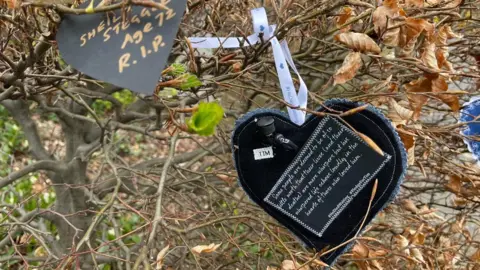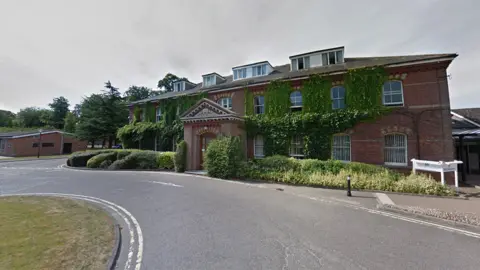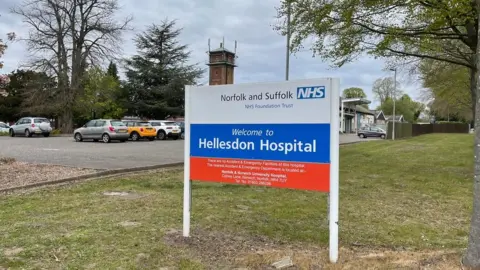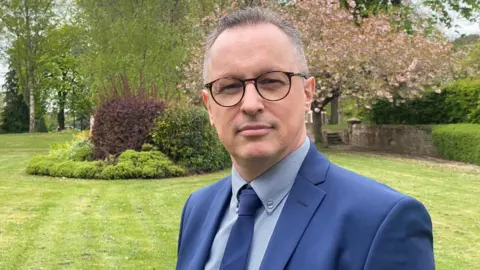Norfolk and Suffolk Foundation Trust: 'We complained but it didn't make things better'
 Getty Images
Getty ImagesNorfolk and Suffolk NHS Foundation Trust (NSFT) has been warned by the Care Quality Commission (CQC) that it must improve. Staff and the families of patients (whose names have been changed to protect their identities) tell of their experiences at England's worst-performing mental health trust.
For more than a decade, David's son Paul has been under the care of NSFT.
The trust, which has £305m annual budget and employs 4,227 staff, was last week threatened with enforcement action if urgent measures were not taken.
Following the latest CQC inspection, the trust was downgraded from "requires improvement" to "inadequate" and it remains the only mental health trust within the NHS's improvement regime for not meeting standards.
The CQC's findings came as no surprise to David, who claims he has had to battle to get Paul the help he needs.
While he says he cannot fault individual carers, he claims the trust is beset by "box-ticking" culture that hinders clinicians from helping the people they see.
"When someone is critically ill the service should wrap around them, not work to fit them into a box," David says.
"Every 15 minutes, someone ticks a box to say they're 'still alive' rather than invest time and effort with them as an individual," he says. "We made a couple of complaints but it didn't make anything better - they don't learn the lessons."
 Jamie Niblock/BBC
Jamie Niblock/BBCLaura tells of a similar experience.
When her daughter suddenly became seriously mentally unwell, she felt it was a battle to get staff at NSFT to engage with her.
Her daughter had to wait to be seen face to face by the crisis team and, despite repeatedly asking for help, she was told they had to wait.
Days later her daughter became so unwell she was taken to hospital and sectioned under the mental health act.
Laura says the first point of contact with NSFT needs to be better to prevent more incidents like her daughter experienced.
"It was the worst experience of my life," she says.
 Google
GoogleLaura says she finds it infuriating because her daughter was actively seeking help.
"It might not have prevented the crisis but if they had come out sooner but she could have consented to help and not been sectioned, she could have been medicated much sooner... because she was left on her own she didn't know what to do."
Since then Laura says the majority of her daughter's care under the trust has been good but that waiting for the mental health team to engage with her had been "a terrible, terrible time".
'Amazing care'
Lily, whose son has been in the trust's care for several years, has had a vastly different experience.
The care she and her son have received, Lily says, has been nothing short of "amazing".
When her son was put in the trust's care, Lily feared for him because of the negative reports she had read.
Those reports do not tally with Lily's own experiences, she says.
She tells of an organisation where staff go out of the way to help not just patients, but their families as well.
"I literally think if it was not for NSFT, I think I would have had a breakdown," she says.
Addressing the concerns of some families about access to one-to-one care for those in crisis, a spokesperson for the NSFT says: "We expect our doctors to see their patients regularly in person.
"In some cases, this might need to be only once a week, this is the minimum we expect and for people who need to see their doctor more often, they must be able to do so.
"During the pandemic there were some doctors who needed to work remotely to reduce their risk of harm from Covid, and we know this did lead to some people feeling they didn't see enough of their doctors.
"We have listened to this feedback and for several months now have expected our doctors to see all of their patients on wards, in person, regularly.
"Consultant psychiatrists work as part of a team, alongside other doctors and professionals including psychological therapists. All of whom are integral to supporting patients, including those with suicidal thoughts."

What was it like working at the trust?
 Martin Giles/BBC
Martin Giles/BBCMary O'Sullivan says she sought therapy after working for NSFT.
She says she was left covering reception which involved taking calls from patients contemplating suicide.
In 2020, when she was 18 years old, Ms O'Sullivan began an apprenticeship at NSFT as part of her customer service course at a local college.
She was asked to cover the reception at Mary Chapman House in Norwich for three months because of a staffing shortage caused by the Covid pandemic.
She ended up working alone, she says.
"I was just kind of thrown in at the deep end," she says. "A lot of the calls were suicidal calls and there were calls that I had to listen to first and try and decipher, before I moved them on to doctors or try and get hold of people.
"A lot of the time I couldn't get hold of the doctors that they needed to speak to."
She left the trust in August 2021 and it is understood a grievance process is under way.
 Jamie Niblock/BBC
Jamie Niblock/BBCNicki Bramford, service director for children, young people and families at NSFT, says: "It's very important to us to make sure that we look after the mental health and emotional wellbeing of our staff.
"A full training and support package was put in place for Mary to ensure that she was supported in familiarising herself with her role.
"When Mary raised her concerns with us, we made adjustments to her working conditions to support her development and helped her to access our staff assistance scheme, occupational health support and our Wellbeing service."

'We want this to get out there'
Some of the staff who work for the trust were relieved to see the various issues raised CQC report aired publicly, one current employee told the BBC.
"We want this to get out there," she says. "If they [the trust's leadership] were a football team they would have been relegated.
"It's all on them [the leadership team], how can these people remain?
"This cannot get any worse."
 John Fairhall/BBC
John Fairhall/BBCStuart Richardson, the trust's chief executive, says: "We recognise that sometimes people have to wait for longer than we would like to access care and support, and I am deeply sorry for this and the impact this will have had on them and their families.
"We know that we need to create a more open and honest working environment for our staff to enable them to provide good quality mental health services for the people of Norfolk and Suffolk.
"We have already taken action that will help us improve, including increasing support and training for our staff, redoubling our efforts to recruit more nurses and doctors, and bringing services closer to people's homes through our community transformation projects."
A Department for Health and Social Care spokesman would not comment on the trust specifically but says plans are in place to "transform mental health services in England".
"It is vitally important we learn from any mistakes made to improve care across the wider NHS and protect patients in the future," he says.

Find BBC News: East of England on Facebook, Instagram and Twitter. If you have a story suggestion email [email protected]
